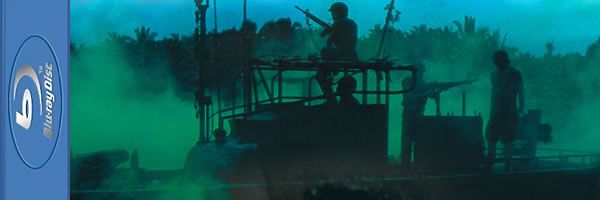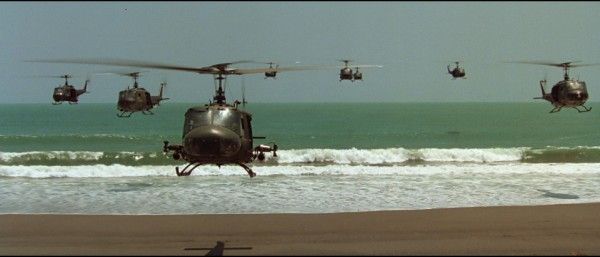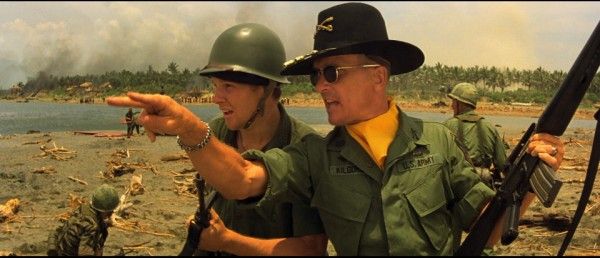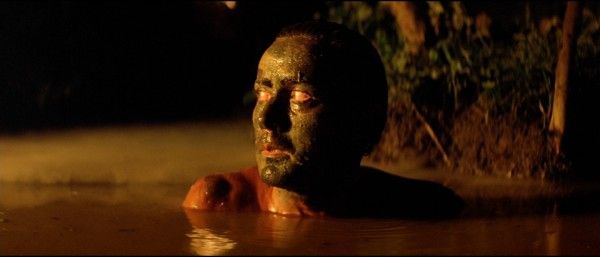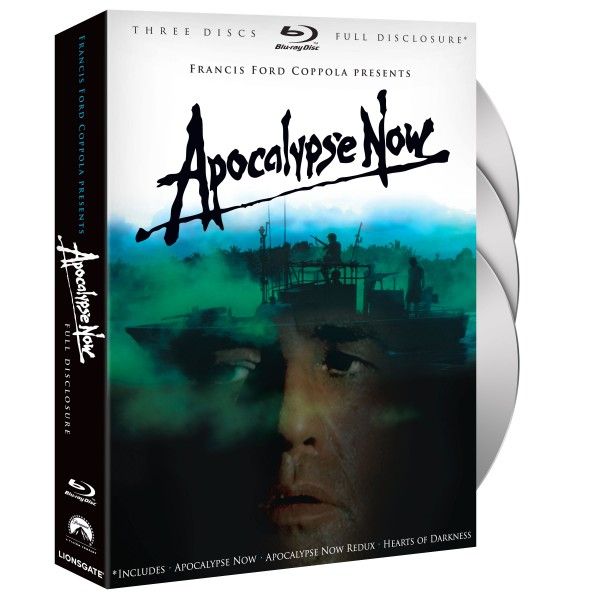Finally, the definitive Apocalypse Now! Francis Ford Coppola’s mess of a masterpiece is one of those films worth poring over, examining and dissecting, and this format and new supplements make for a heady package. Martin Sheen stars as Captain Benjamin Willard, who along with a boatload of soldiers (Albert Hall, Laurence Fishburne, Sam Bottoms, and Fredrick Forrest) traverse Vietnam on the hunt for Colonel Kurtz (Marlon Brando), who’s gone native and Willard’s mission states that they don’t really want him bringing Kurtz back alive. Along the way, they meet a number of different people, including Lt. Colonel Kilgore (Robert Duvall), Playboy bunnies (including Colleen Camp), and other assorted characters, more so in the Redux version, which includes the famously deleted French colonists. My review of the Apocalypse Now Full Disclosure edition on Blu-ray follows after the jump.
Sheen’s Willard is a mess. Having done his tour of duty, he went home and lost his wife, and has now returned back to hell, to go on a spiritual journey as it were to find himself. At least that’s the start of the film. The poetry of the imagery is Coppola at the top of his game, but the film never gives Willard as much to do again in the narrative - he’s the tour guide of the movie. Given a top secret mission to take down Kurtz, he’s assigned to a boat with the meticulous Chief Phillips (Hall), surfer Lance B. Johnson (Bottoms), cook Jay “Chef” Hicks (Forrest), and child Tyrone “Clean” Miller (Fishburne). Phillips has his shit mostly together, but the others are just kids stuck in ‘Nam, easily distracted and happy to get high and hang out.
Their first big experience is with Kilgore, who is a heroic but buffoonish Colonel who wants his men to be able to surf, so they go on a helicopter raid to hit a spot with awesome waves. Kilgore takes over the movie – and in that John Milius’s script work becomes most apparent as Kilgore comes across as Milius’s dream version of himself, and Duvall’s Oscar nomination was well deserved as his character leaves an indelible impression. Few film quotes sear into one’s head as effectively as “I love the smell of napalm in the morning. You know, one time we had a hill bombed, for 12 hours. When it was all over, I walked up. We didn't find one of 'em, not one stinkin' dink body. The smell, you know that gasoline smell, the whole hill. Smelled like…. victory. Someday this war's gonna end.” Note: When I talk to filmmakers during the production process, “Someday this war's gonna end” is always something that comes to mind – they hate it but never want it to end.
Like Dante’s Inferno, there are many circles to this hell they’ve entered into, and this is the outset. The next section of the film is probably my favorite, as it has one of the most effective jump scares in cinema. The boys stop near some land for a piss and a break, and out comes a tiger. Chef starts screaming about never getting off of the boat, and everything gels in that moment. They’ve entered into a world beyond their control, and the environment is plotting against them. This leads to them meeting the sirens (there’s definitely both The Odyssey and Dante to this enterprise along with Joseph Conrad), a group of Playboy bunnies there to entertain the troops. As there’s nothing but men there, the presentation ends horribly because the men just want sex (the girls get more to do in the extended cut, but this mostly just offers nudity). Afterwards the boys find themselves coming into direct conflict with the natives, and this sequence summarizes Coppola’s understanding America’s involvement in Vietnam in a very succinct way, and why America “lost” the war.
From there things get dark as the boys head to a campsite where no one knows who is in charge any more, but bullets and bombs are flying, and a firefight leads to the first death of the group. The Redux version segues into the French colonist sequence that restates much of what’s already there, and slows the film, but is fascinating on its own. Ultimately the Redux cut does little in my mind to improve the film; it just shows where the film could have gone. As the movie is essentially a series of anecdotes, having more character moments in this epic doesn’t really hurt, but they often reiterate points that already came across. Coppola has called the film not about Vietnam, but Vietnam, and I get it. The film was chaos to make, and that chaos comes across on screen. As the boat loses more members, they finally get to Kurtz’s compound, where they meet a photojournalist (Dennis Hopper), the man who was originally intended to capture Kurtz (Scott Glenn), and finally Kurtz himself.
Here is where the film loses what it became, as it starts to really embrace the Conrad text as the two begin a discussion that is essentially Brando’s Kurtz ranting poetry. Brando is shot well, but Kurtz as a character on screen is half-baked. He’s a cult leader with little messianic actions. But regardless, Brando is fascinating, even if he is stumbling. When it comes to the ending, the struggles the filmmakers faced trying to tie it all up are apparent. The film works best a collage, and when it’s on it’s one of the greatest films ever made, but the film never congeals. Maybe it doesn’t have to, because the experience of watching it is so profound, and you’re so with a director who is able to evoke so much. Apocalypse Now is one of the great triumphs of execution over intention. There’s so much here that to call it anything less than a great film is folly, but like Intolerance or 1900, it’s a work of greatness that never gets its arms around what it’s after.
Lionsgate’s Blu-ray presents the film in widescreen (2.35:1) and in 5.1 DTS-HD surround. This is a surround heavy movie, and the home video mix is superb. This is the first time in America the film has been presented in the correct aspect ratio, and the film has never looked better. Paramount’s previous “Full Dossier” edition included both cuts, but this takes that special edition a step further. The film is on the first disc – no interruptions – in a branching video presentation, with both cuts featuring a commentary by Coppola that is very smart about his feelings about the film. Coppola knows how to talk, and here he is the master showman. It’s a great commentary on either cut.
Disc two kicks off with a great interview with John Milius (50 min.) where he and Coppola talk about the genesis of the project and what they think about the film. It’s riveting stuff, and it’s followed by an equally personable and revelatory discussion between Coppola and Martin Sheen (59 min.) where they cover some of the comments Francis made about Martin whilst he was recovering from a heart attack. Time heals wounds, it seems. This is followed by Fred Roos talking about casting the film (12 min.), and shows footage from the casting process. Orson Welles famously tried to make Heart of Darkness into a feature and his Mercury radio presentation is faithfully included (37 min.). “The Hollow Men” (17 min.) is a resuscitation of the famous T.S. Elliot poem by Brando accompanied by cut footage from the film and behind the scenes footage. This is followed by “Monkey Sampan” which is a lost scene (3 min.) and an additional twelve alternate scenes and a collection unused footage (26 min.). Some of this existed in bootleg format before, and here the footage seems to be from an early VHS cut of the film (it also suggests an over six hour cut for the film). This is followed by an alternate credit sequence with the destruction of the Kurtz compound (6 min.), which went out with some prints. “The Birth of 5.1 Sound” (6 min.) talks about the film’s early use of surround audio, while “Ghost Helicopter” (4 min.) talks to the film’s opening and how it was mixed, while “Apocalypse Now: The Synthesizer Soundtrack by Bob Moog” is an article from Contemporary Keyboard Magazine. There’s a featurette on the editing (18 min.) – which involved cutting over a million feet of film – the music (15 min.), the sound design (15 min.), and the “final” mix (3 min.). This is followed by “Apocalypse Then and Now” (4 min.) on the Redux and the old cut, Coppola at the 2001 Cannes with Roger Ebert, where Redux first played (39 min.). The “PBR Streetgang” (4 min.) gets Fishburne, Hall, Forrest and Bottoms to talk about being on the boat, while “The Color Palette” (4 min.) gives Vittorio Storaro his due – slightly - in terms of the film’s new color design for the re-release. Also on disc two are the film’s credits and bonus trailers for Tetro and The Doors, and tells us that The Conversation is headed to Blu-ray in 2011.
Disc Three includes the documentary Hearts of Darkness: A Filmmakers Apocalypse. Filmmaker George Hickenlooper spent the last years of his life trying to reclaim the film as one of his projects, while Eleanor Coppola is given credit by Francis for the film. Without wading into that political battlefield. Darkness is one of the greatest supplements ever produced, and one of the best documentaries ever made about a movie. It’s as essential to watch as the film itself, and I understand why Gene Siskel said it was a better movie than Apocalypse Now. The film comes with a commentary by Francis and Eleanor Coppola, which is honest, to a point. John Milius’s script is excerpted with notes from Coppola, which is followed by a storyboard collection, and a photo and marketing archive. The latter included the film’s trailer, radio spots, the film’s theatrical program, lobby cards and press kits, and a poster gallery.
[screen captures courtesy of DVDBeaver]

